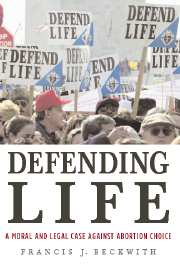Book contents
- Frontmatter
- Contents
- Acknowledgments
- Introduction
- PART I MORAL REASONING, LAW, AND POLITICS
- PART II ASSESSING THE CASE FOR ABORTION CHOICE AND AGAINST HUMAN INCLUSIVENESS
- 4 Science, the Unborn, and Abortion Methods
- 5 Popular Arguments
- 6 The Nature of Humanness and Whether the Unborn Is a Moral Subject
- 7 Does It Really Matter Whether the Unborn Is a Moral Subject? The Case from Bodily Rights
- PART III EXTENDING AND CONCLUDING THE ARGUMENT
- Notes
- Selected Bibliography
- Index
6 - The Nature of Humanness and Whether the Unborn Is a Moral Subject
from PART II - ASSESSING THE CASE FOR ABORTION CHOICE AND AGAINST HUMAN INCLUSIVENESS
Published online by Cambridge University Press: 05 June 2012
- Frontmatter
- Contents
- Acknowledgments
- Introduction
- PART I MORAL REASONING, LAW, AND POLITICS
- PART II ASSESSING THE CASE FOR ABORTION CHOICE AND AGAINST HUMAN INCLUSIVENESS
- 4 Science, the Unborn, and Abortion Methods
- 5 Popular Arguments
- 6 The Nature of Humanness and Whether the Unborn Is a Moral Subject
- 7 Does It Really Matter Whether the Unborn Is a Moral Subject? The Case from Bodily Rights
- PART III EXTENDING AND CONCLUDING THE ARGUMENT
- Notes
- Selected Bibliography
- Index
Summary
Most supporters of abortion choice agree with pro-life advocates that the question of abortion's permissibility rests on the moral status of the unborn: abortion is prima facie unjustified homicide if and only if the unborn entity is a full-fledged member of the human community (i.e., a person or a subject of moral rights). Most abortion-choice advocates also agree with pro-life supporters that the unborn entity is a human being insofar as it belongs to the species Homo sapiens. Where they disagree is over the question of the moral status of the unborn. These abortion advocates argue that the unborn entity is not a person and hence not a subject of moral rights until some decisive moment in fetal or postnatal development.
Consequently, these abortion-choice supporters argue that not all human beings are equally intrinsically valuable (IV) because some do not have the present capacity to exhibit certain properties or functions that would make them IV. I call the defender of this point of view the anti-equality advocate (AEA). Although these thinkers disagree among themselves as to what these properties or functions are – some offer sentience, others suggest “ability to reason” and/or self-awareness or some combination of these – these criteria all have one thing in common: a human being is IV if and only if she presently possesses certain properties and/or is able to exercise certain functions.
- Type
- Chapter
- Information
- Defending LifeA Moral and Legal Case against Abortion Choice, pp. 130 - 171Publisher: Cambridge University PressPrint publication year: 2007
- 1
- Cited by



